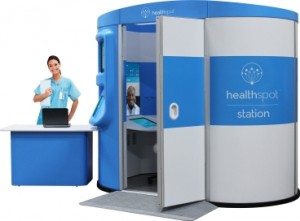 Telecom giant Cox Communications announced last week that it was teaming up with the Cleveland Clinic to form a "strategic alliance", called Vivre Health, that would develop digital home health services. The joint venture will be based in Atlanta and will help Cox move its healthcare business beyond providing broadband services to hospitals, according to Reuters. As part of the announcement Cox disclosed that it had also made an investment in health kiosk company HealthSpot, but the amount remains undisclosed.
Telecom giant Cox Communications announced last week that it was teaming up with the Cleveland Clinic to form a "strategic alliance", called Vivre Health, that would develop digital home health services. The joint venture will be based in Atlanta and will help Cox move its healthcare business beyond providing broadband services to hospitals, according to Reuters. As part of the announcement Cox disclosed that it had also made an investment in health kiosk company HealthSpot, but the amount remains undisclosed.
A HealthSpot spokesperson told MobiHealthNews in an email that the investment is related to the joint venture because HealthSpot shares Cox's and Cleveland Clinic's vision to bring healthcare to the home in the future. "Cox believes that HealthSpot’s technology will help provide a path to the home," she wrote.
It's possible that the joint venture HealthSpot and Cleveland Clinic signed a letter of intent for last May is the same as Vivre Health. HealthSpot said it would reveal more in the coming days.
Cleveland Clinic launched a pilot with Cox-rival Time Warner more than a year ago to determine the feasibility of setting up remote visits with patients discharged from the hospital after installing cameras that connected to the patient's TV. Video services provider Tely Labs was another partner in that pilot.
Neither Cleveland Clinic nor Time Warner has discussed the pilot's results and last week's new Cox JV suggests Cleveland Clinic has moved on. Update: Or maybe not. A Time Warner spokesperson said that while that trial has ended, the company still has a "strong and growing relationship with Cleveland Clinic" for a number of products and services.
Another big telecom company, Comcast, made headlines last August with video visits upstart Doctors On Demand. The company announced Comcast as one of its newest customers. Comcast offers Doctor On Demand to all of its US employees and is fully subsidizing the service for some of its employees. Like most video visits services, it costs about $40 per visit. Apart from this and its venture arm's investment in BodyMedia years ago, Comcast has been relatively quiet on the digital health front.
As we have chronicled over the years, both AT&T and Verizon have been very active in digital health over the years, and each has tried its hand at developing digital health products and services.
Verizon recently pulled its own video visits product as well as its FDA-cleared telehealth hub software, but the company is still focused on providing telehealth components BtoB as well as services for the healthcare enterprise. AT&T's most recent digital health product, a mobile-enabled personal emergency response service (PERS), called EverThere, appears to have been taken off the market in early December. As of September, a similar service was slated to be a part of AT&T's Digital Life initiative.
Cox isn't the first big cable or telecom company to explore telehealth services, and publicly, Vivre Health barely exists outside of the company's recent press release -- few details, no launch date, no website. But a joint venture with Cleveland Clinic positions it among its peers as one of the more serious contenders.
















